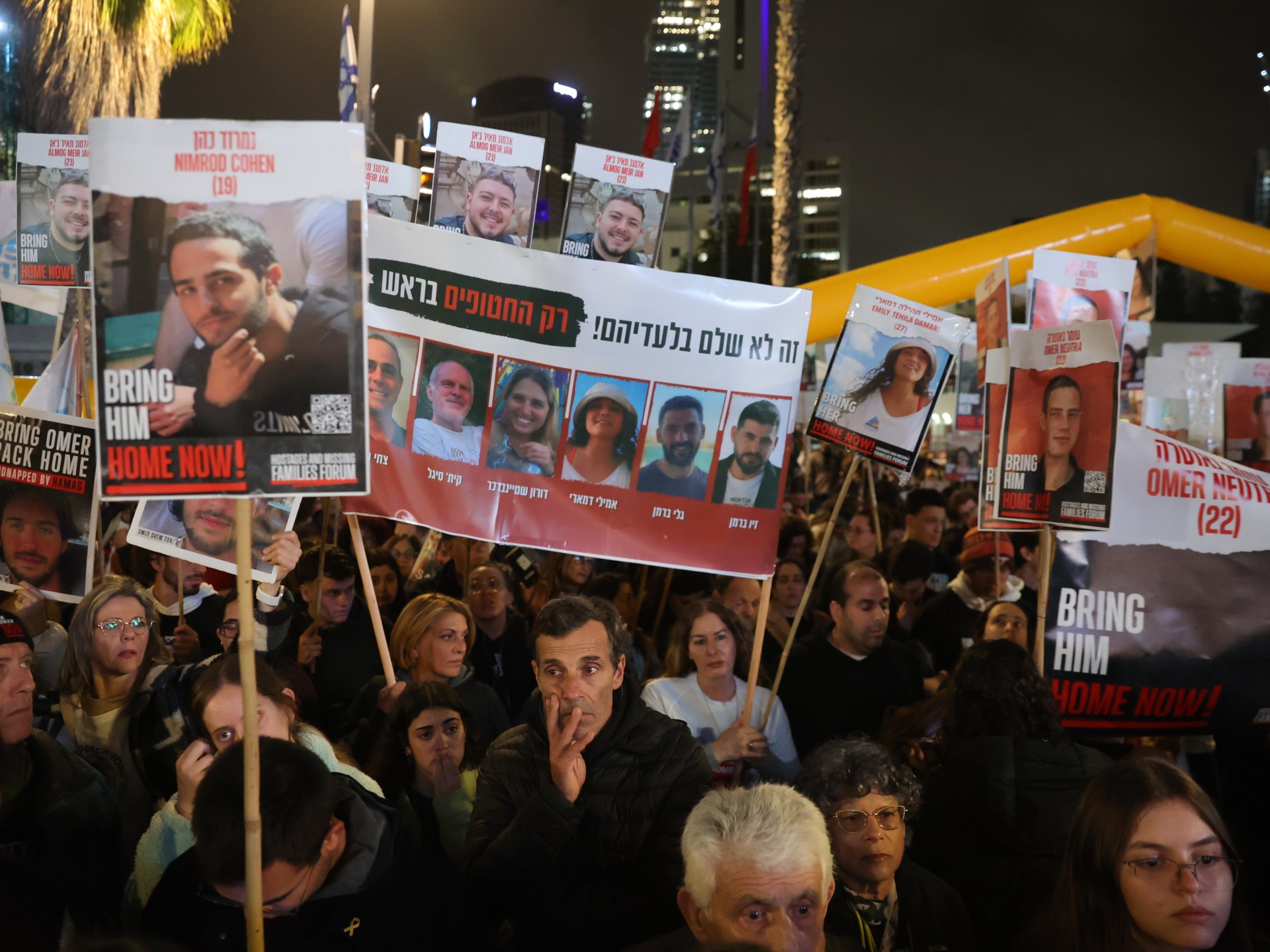Israeli protesters carry pictures of some of those detained by Hamas, demanding a deal to release them (European)
Although the United States talks about making progress that may lead to an exchange agreement between the Islamic Resistance Movement (Hamas) and Israel and a ceasefire in Gaza, and despite the existing optimism, the road to achieving this is still long, and negotiations are expected to be difficult. According to a report by Yedioth Ahronoth newspaper.
The Israeli newspaper recalled at the beginning of its news analysis the announcement of Israeli Prime Minister Benjamin Netanyahu that some of the demands of the Hamas movement, namely the release of thousands of prisoners and the withdrawal of the Israeli army from the Gaza Strip, could not be met.
She pointed out that Israel, the United States, Qatar and Egypt reached a consensus on an agreement that includes a 45-day ceasefire that coincides with the release of Israeli detainees held by Hamas.
The newspaper said that the agreement will also include the release of Palestinian prisoners, with specific details, such as the number of fighters among them who will be released for each Israeli detainee and the identity of the prisoners, which will be discussed between the two sides, and in addition, humanitarian aid entering the Gaza Strip will be increased.
Once Hamas announces its acceptance of the initial agreement, intensive negotiations will begin on its basic provisions. However, the newspaper says that it is clear that Hamas will not accept an agreement similar to the previous one, which stipulated the release of 3 Palestinian prisoners for every Israeli detainee.
Under the previous agreement, the Palestinian movement released a number of women and children up to the age of 19, in exchange for the release of Palestinian female prisoners and minors.
numbers
But this time, according to a Yedioth Ahronoth report, it is expected that Hamas will demand between 100 and 300 prisoners for every Israeli prisoner released.
Hamas' conditions for returning Israeli bodies detained in Gaza are still unclear, and it is not known whether the movement will agree to exchange them for the bodies of Hamas members, or whether it will request the release of additional prisoners, according to the newspaper's report.
Hamas is currently detaining - according to Tel Aviv's estimates - 136 Israelis, the deaths of 29 of whom have been confirmed, and 4 individuals who were already detained in Gaza before the “Al-Aqsa Flood” battle on October 7, 2023.
If Hamas's demands are met, this will likely lead to the release of thousands of Palestinian prisoners, the report claims.
The newspaper pointed out that the Israeli Prime Minister set limits to the possible prisoner exchange deal when he said that “thousands of terrorists will not be released,” in reference to imprisoned Hamas members in Israel.
However, it quoted news reports about the possibility of Israel releasing between 4,000 and 5,000 Palestinian fighters as part of the expected deal. The newspaper considered this the largest number of prisoners Israel has ever released.
Demonstrators carry pictures of detainees held by Hamas during a march marking the 100th day of their detention (Getty)
Test balloon
However, sources close to Israeli National Security Minister Itamar Ben Gvir, quoted by Yedioth Ahronoth, believe that Netanyahu's statement is nothing more than a "trial balloon" for the circle around him.
They believe that this is just a strategic move by the Prime Minister so that the deal will be seen as a success for him, even if half of the proposed number of Palestinian prisoners are eventually released.
But after the complex issue of prisoners is agreed upon, Hamas also insists on the complete withdrawal of the Israeli army from Gaza, according to the newspaper.
There is another question that must be discussed in the negotiations: Can Israel prevent Gazans from reaching the northern Gaza Strip for 45 days? What will happen after the ceasefire during the aforementioned period, especially since Netanyahu keeps repeating that the war will not end unless Israel achieves all its goals?
However, according to an Israeli source, reaching an agreement is very likely for one reason: US President Joe Biden is determined to end the war and hopes that the prisoner deal will lead to a long-term ceasefire, according to the newspaper.
Source: Yedioth Ahronoth

